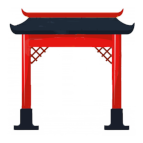|
|
做
|
 |
|
JLPT HSK 1 |
|
| to do, to make, to compose
|
Left person 亻, right: therefore, reason 故 (If the old 古 (man) strikes 攵 then with a reason) [to strike 攵/攴 = hand 又 with a stick 卜]
The person has a reason to do sth.

|
|
|
|
故
|
 |
|
JLPT HSK 3 |
|
| reason, cause, intentional, therefore, hence
|
Left: old 古 (image of a tomb stone), right: strike 攵/攴 (hand 又 with a stick 卜)
If the old (man) hits, then intentionally and with a reason.

|
|
|
|
居
|
 |
|
JLPT HSK 3 |
|
| residence, to reside, live
|
Top: buttocks seen from the side 尸, below: old 古 (originally derived from the image of a skull, hence "old"; the idea of a burial mound is also helpful)
Where the buttocks becomes old, he has his residence.

|
|
|
|
克
|
 |
|
JLPT HSK 4 |
|
| to subdue, to overthrow, gram
|
Top: ten 十, below: older brother 兄 (A big mouth 口 on feet 儿)
(The inferior must leave the battle-field, such as to run away using the legs:) The old 古 gets legs 儿, if it is subdued.

|
|
|
|
估
|
 |
|
JLPT HSK 4 |
|
| estimate, reckon, assessment, merchant
gū, gù
亻
古
 |
|
Left: person 亻, right: old 古 (originally: skull, but here better as image a tomb stone)
A person who is old (and experienced) is good in estimating.

|
|
|
|
苦
|
 |
|
JLPT HSK 4 |
|
| bitter, hardship, pain, to suffer
|
Top: plant 艹, below: old 古 (Pictogram of a tomb stone)
Plants (or herbs) that are old, taste bitter.

|
|
|
|
固
|
 |
|
JLPT HSK 5 |
|
| hard, strong, solid, undoubtedly
|
Outside frame 囗, but here: mouth 口, inside: old 古 (= tomb stone). [Some things like the meat of old animals or full-grown vegetable becomes hard with age.]
In the mouth old things taste: hard. [In contrast: In the mouth 口 have young things (= this is "not yet 未") a special taste 味]

|
|
|
|
潮
|
 |
|
JLPT HSK 5 |
|
| tide, current, damp, moist
|
Left: water 氵, right: dynasty, government 朝 Here: a lake 湖, having the part old: 古 once normal and upside-down to express changing directions
Like a lake 湖 with changing directions are the seawater's tides.

|
|
|
|
舍
|
 |
|
JLPT HSK 5 |
|
| residence, to give up, to abandon, to give alms
shě, shè
舌
古
 |
|
Top: cover  , below: old 古 , below: old 古
The special cover for myself 人 to become old is my residence.

|
|
|
|
姑
|
 |
|
JLPT HSK 5 |
|
| paternal aunt, husband's sister, husband's mother (old)
|
Left: woman 女, right: old 古 (originally a skull, but better the image of a tomb stone)
The woman who is old, is the paternal aunt.

|
|
|
|
滴
|
 |
|
JLPT HSK 5 |
|
| a drop, to drip
|
Left: water 氵, right: old emperor (mix of emperor 帝 and old 古) [Emperor 帝 = Stand up 立 and cover 冖 yourself with cloth 巾, the emperor is coming.]
(Due to problems with the prostate gland) Passing 'water', can the old emperor only drop by drop.

|
|
|
|
摘
|
 |
|
JLPT HSK 5 |
|
| to pick (flowers, fruit), pluck, take, borrow
|
Left: hand 扌, right: old emperor 啇 (mixture of emperor 帝 and old 古 [emperor 帝 = Stand up 立 and cover 冖 yourself with cloth 巾, the emperor is coming]
The hand of the old emperor is picking/plucking sth.

|
|
|
|
胡
|
 |
|
JLPT HSK 5 |
|
| beard, mustache, non-Han people, reckless
|
Left: old 古 (image of a tomb stone), right: flesh, body part 月/肉
Like old flesh are the beards of the non-Han people.

|
|
|
|
古
|
 |
|
JLPT HSK 5 |
|
| ancient, old, paleo-
|
Ten 十 and mouth 口. (古 was derived from the image of a skull, therefore the meaning of old. Helpful is also the image of a grave mound)
Below the tomb stone is lying the 'old'.

|
|
|
|
啥
|
 |
|
JLPT HSK 6 |
|
| What?, dialectal equivalent of 什么
|
Left: mouth 口, right: house, home 舍 (The particular cover  under which I become old 古, is my home.) under which I become old 古, is my home.)
The mouth sees the home and asks: What?

|
|
|
|
枯
|
 |
|
JLPT HSK 6 |
|
| withered, dried up
|
Left: tree 木, right: old 古 (originally: skull, but better as the image of a tomb stone)
The tree is old and withered.

|
|
|
|
辜
|
 |
|
JLPT HSK 6 |
|
| crime, sin, guilt
|
Top: old 古 (originally: skull, but better the image of a tomb stone), below: bitter, sharp 辛 (tattoo needle)
The old and bitter are the guilt of the crimes.

|
|
|
|
兢
|
 |
|
JLPT HSK 6 |
|
| apprehensive, to be fearful, tremble
|
Twice: subdue 克 (The old 古 gets legs 儿, when it is subdued)
Being doubly subdued is apprehensive.

|
|
|
|
哉
|
 |
|
JLPT no HSK |
|
| (exclamatory or interrogative particle)
|
Here, see top&right as variant of military 戎 (= with the ten 十 [men] at the halberds 戈), below: mouth 口
At the military, out of the mouths 口 comes a cry of exclamation. - Or: "An old 古 halberd 戈!", was what he exclaimed.)

|
|
|
|
咕
|
 |
|
JLPT no HSK |
|
| mumble, mutter, murmur
|
Left: mouth 口, right: old 古 (originally: skull - better the image of a tomb stone)
A mouth that became old, can only: mumble.

|
|
|
|
葫
|
 |
|
JLPT no HSK |
|
| bottle-gourd, calabash, allium scorodoprasum
|
Top: plant 艹, below: beard, non-Han-person 胡 (Like old 古 flesh 月/肉 are the beards of the non-Han people.)
(The skin can be used as a drinking-vessel.) The plant where the 'old body' is used: The bottle-gourd.

|
|
|
|
菇
|
 |
|
JLPT no HSK |
|
| mushroom
|
Top: plant 艹, bottom: paternal aunt 姑 (the woman 女 who is old 古)
The plants (collected) by the old women, are the: mushrooms.

|
|
|
|
嘀
|
 |
|
JLPT no HSK |
|
| backbite
|
Left: mouth 口, right: old emperor 啇 (mix of emperor 帝 [He stands 立 and is covered 冖 with cloth 巾] and is old 古)
From the mouth of the old emperor: a backbite.

|
|
|
|
沽
|
 |
|
JLPT no HSK |
|
| to buy, to sell, abbr. for Tianjin 天津 (also 津沽)
|
Left: water 氵, right: old 古 (originally: a skull but better as the image of a tomb stone)
If the water is old, we need to buy.

|
|
|
|
骷
|
 |
|
JLPT no HSK |
|
| skeleton, human skull
|
Left: skeleton 骨 (image of a vertebra, cover 冖, body/flesh 月), right: old 古 (originally: a skull, but it's better to imagine a tomb stone)
The skeleton at the tomb stone: a skeleton.

|
|
|
|
嫡
|
 |
|
JLPT no HSK |
|
| direct line of descent, son of first wife
|
Left: woman 女, right: old emperor (mixture of emperor 帝 and old 古) [emperor 帝 = Stand up 立 and cover 冖 yourself with cloth 巾, the emperor is coming.]
The (first) wife of the old emperor stands for the line of descent.

|
|

 , below: old 古
, below: old 古